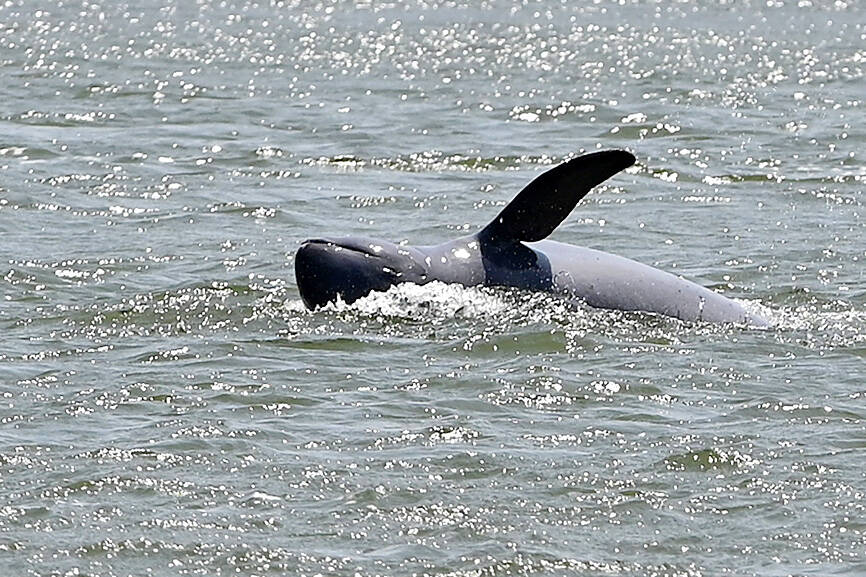Cambodian Prime Minister Hun Sen yesterday canceled a law he created just two months ago to protect critically endangered Mekong dolphins as the mammals continue to die from illegal fishing activities.
ILLEGAL FISHING
The population of Irrawaddy dolphins in the Mekong River has dwindled from 200, when the first census was taken in 1997, to just 89 in 2020 largely due to illegal fishing and habitat loss.

Photo: AFP
Hun Sen in February issued a new decree creating protection zones in a 120km stretch of the Mekong, in which fishing is banned, following the death of three dolphins in a week.
Conservationists have also stepped up efforts to protect the mammals — small, shy creatures with domed foreheads and short beaks that once swam through much of the river, all the way to the delta in Vietnam.
However, two dolphins have since died, including a four-day-old calf found dead last week entangled in fishing nets.
Hun Sen yesterday said he had decided to cancel the new decree, because “dolphins keep dying and thousands of fishing families were affected.”
“We want to protect dolphins that are at risk of becoming extinct, but dolphins keep dying,” he said at an event in Phnom Penh.
“Dolphins keep entangling in gillnets, despite the ban,” he said, referring to nets strung across the river by fishers.
LIVELIHOOD
Hun Sen said the law also affected thousands of families who depend on fishing in the Mekong.
“Shall we continue this? We must annul it and let people get benefits from the river,” he said.
Hun Sen asked authorities to implement old regulations to ban fishing in parts of the dolphin zones and to crack down on electrofishing.
Eleven dolphins died last year, bringing the total number of dead dolphins to 29 in the past three years, the World Wildlife Fund said.

Thousands gathered across New Zealand yesterday to celebrate the signing of the country’s founding document and some called for an end to government policies that critics say erode the rights promised to the indigenous Maori population. As the sun rose on the dawn service at Waitangi where the Treaty of Waitangi was first signed between the British Crown and Maori chiefs in 1840, some community leaders called on the government to honor promises made 185 years ago. The call was repeated at peaceful rallies that drew several hundred people later in the day. “This government is attacking tangata whenua [indigenous people] on all

RIGHTS FEARS: A protester said Beijing would use the embassy to catch and send Hong Kongers to China, while a lawmaker said Chinese agents had threatened Britons Hundreds of demonstrators on Saturday protested at a site earmarked for Beijing’s controversial new embassy in London over human rights and security concerns. The new embassy — if approved by the British government — would be the “biggest Chinese embassy in Europe,” one lawmaker said earlier. Protester Iona Boswell, a 40-year-old social worker, said there was “no need for a mega embassy here” and that she believed it would be used to facilitate the “harassment of dissidents.” China has for several years been trying to relocate its embassy, currently in the British capital’s upmarket Marylebone district, to the sprawling historic site in the

A deluge of disinformation about a virus called hMPV is stoking anti-China sentiment across Asia and spurring unfounded concerns of renewed lockdowns, despite experts dismissing comparisons with the COVID-19 pandemic five years ago. Agence France-Presse’s fact-checkers have debunked a slew of social media posts about the usually non-fatal respiratory disease human metapneumovirus after cases rose in China. Many of these posts claimed that people were dying and that a national emergency had been declared. Garnering tens of thousands of views, some posts recycled old footage from China’s draconian lockdowns during the COVID-19 pandemic, which originated in the country in late

BACK TO BATTLE: North Korean soldiers have returned to the front lines in Russia’s Kursk region after earlier reports that Moscow had withdrawn them following heavy losses Ukrainian President Volodymyr Zelenskiy on Friday pored over a once-classified map of vast deposits of rare earths and other critical minerals as part of a push to appeal to US President Donald Trump’s penchant for a deal. The US president, whose administration is pressing for a rapid end to Ukraine’s war with Russia, on Monday said he wanted Ukraine to supply the US with rare earths and other minerals in return for financially supporting its war effort. “If we are talking about a deal, then let’s do a deal, we are only for it,” Zelenskiy said, emphasizing Ukraine’s need for security guarantees